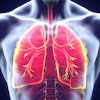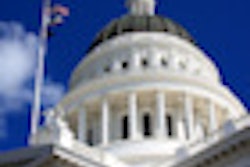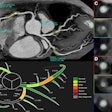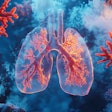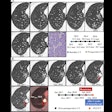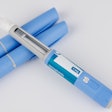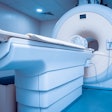Two more hospitals in Southern California admitted this week that patients undergoing perfusion CT brain scans last fall received excessive radiation doses, just as legislation that would require dose levels to be displayed on CT scanners won a vote in the state Assembly.
Los Angeles County (LAC)-University of Southern California (USC) Medical Center in Los Angeles and Bakersfield Memorial Hospital in Bakersfield, CA, are the latest additions to a growing list of U.S. hospitals feeling the heat over perfusion CT brain scans given to patients with suspected stroke.
The state of California and the U.S. Food and Drug Administration (FDA) are investigating the two hospitals, along with others that have been identified in recent months. In the most high-profile case, some 250 patients at Cedars-Sinai Medical Center in Los Angeles got too much radiation in studies performed from February 2008 to August 2009.
Patients receiving the outsized perfusion doses have been left with bands of hair loss surrounding the head, with some individuals also reporting memory loss and other symptoms of radiation overdose.
Lawsuits have been filed against the facilities and against scanner manufacturer GE Healthcare of Chalfont St. Giles, U.K., in connection with incidents at Cedars-Sinai and other U.S. hospitals, as previously reported on AuntMininie.com.
New cases in Los Angeles
In the newest revelations, both LAC-USC and Bakersfield Memorial said they followed imaging protocols provided by the CT scanner's manufacturer, Toshiba America Medical Systems of Tustin, CA. But the California Department of Public Health hasn't absolved the facilities and their staffs of wrongdoing, citing one of them for failing to train its radiologic technologists to read the dose information provided by the CT scanners during the procedure.
At LAC-USC, where two patients received excessive doses, Chief Medical Officer Stephanie Hall, MD, told the Los Angeles Times in an August 3 article that the facility obtained the CT protocols from Toshiba and began performing the scans in the fall of 2009. The Los Angeles facility did not return calls for comment in time for this article.
However, a January 2010 notice of violation from the California Department of Public Health cited the Los Angeles facility for not paying attention to the doses that resulted from the scans.
"CT brain perfusion examinations were being performed utilizing a technique which resulted in higher than necessary radiation doses to patients, and the operator/supervisors were not aware that unnecessary doses were being delivered to patients," according to the notice provided to AuntMinnie.com.
California Department of Public Health spokesperson Ralph Montaño confirmed that the Los Angeles facility was one of four in the state to receive such notices. The other centers were Cedars-Sinai Medical Center in Los Angeles, Providence Saint Joseph Medical Center in Burbank, and Glendale Adventist Medical Center in Glendale.
Ongoing probe in Bakersfield
Bakersfield Memorial Hospital spokesperson Stephanie Willow said the state has not issued any such violations for its facility.
"We self-reported the incident, it's been under investigation, and we've been cooperating with both Toshiba and our medical staff to resolve the issue," Willow told AuntMinnie.com.
California Public Health's Montaño confirmed that no state violations have been issued at Bakersfield Memorial, but declined to comment further. "It's an ongoing investigation at Bakersfield," Montaño said.
An August 2 statement issued by Bakersfield Memorial President and CEO Jon Van Boening said that in February the facility "determined that although the dosage guidelines provided by Toshiba were strictly followed, 16 patients who underwent brain perfusion CT scans received higher-than-recommended dosages of radiation."
The hospital reported the incidents to the state of California and "worked with Toshiba and our radiology staff to ensure this does not happen again," the statement continued. "We have notified all the patients involved and their treating physicians, and no adverse effects have been reported," the statement said.
For its part, Toshiba said it couldn't comment on the case due to an ongoing investigation by the FDA. Toshiba "continues to work with its customers to educate them on dose-reduction technologies" the company said in a statement.
A July 31 New York Times article on radiation overdoses also reported that "an unidentified hospital in San Francisco" was also under investigation, but the state has not issued a notice of violation for overdoses in San Francisco, according to Montaño.
The department "does not comment on current investigations in process," Montaño said. "I can confirm that perfusion radiation scan equipment is being surveyed for safety at every facility in California."
Meanwhile, a bill is moving through the state Legislature, SB 1237, that would require CT scanners operating in the state to display radiation dose levels. The bill has passed the state Senate and is being considered in the Assembly; it was passed out of the Assembly Appropriations Committee by a 17-0 vote on August 4.
By Eric Barnes
AuntMinnie.com staff writer
August 6, 2010
Related Reading
Calif. Senate passes radiation bill, June 2, 2010
FDA hearings rise above medical radiation rhetoric, March 31, 2010
Lawsuit hits GE in Alabama CT overdose case, December 18, 2009
FDA finds new cases of CT radiation overexposure, December 7, 2009
Cedars-Sinai raises tally of radiation overdose cases, November 13, 2009
Copyright © 2010 AuntMinnie.com


